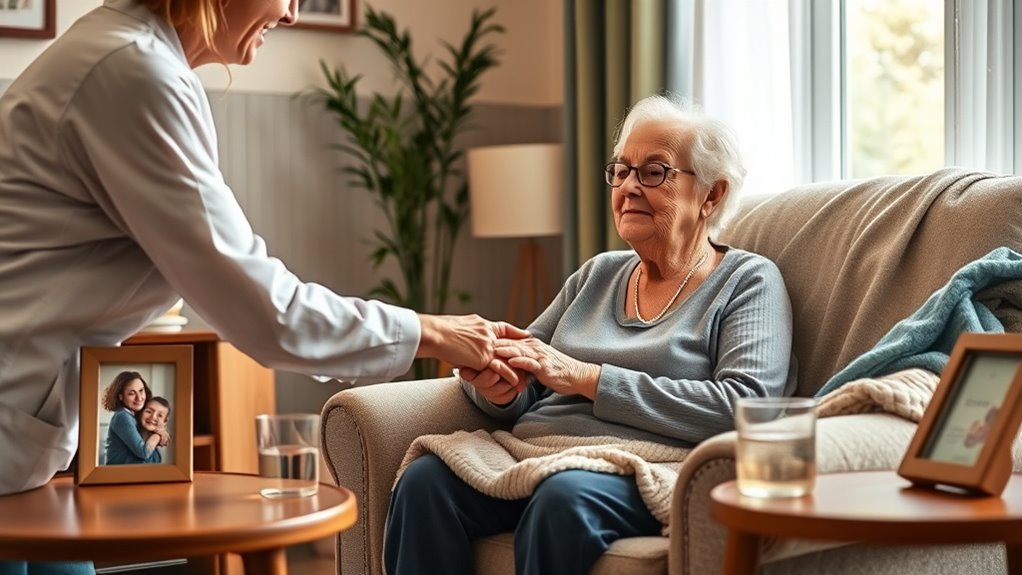To provide effective Alzheimer’s palliative care at home, focus on emotional support through calm communication and validation, while establishing routines to reduce confusion. Keep medications organized and follow healthcare advice closely. Create a safe, soothing environment with visual cues and calming spaces. Prioritize your own self-care and seek support when needed, as caregiving is demanding. Paying attention to your loved one’s comfort and stability is key—exploring these tips further helps you become more confident in your care.
Key Takeaways
- Establish consistent routines and a calming environment to reduce confusion and anxiety.
- Maintain detailed medication schedules and monitor effects to ensure proper management.
- Offer emotional reassurance and gentle communication to support the loved one’s emotional well-being.
- Seek support from caregiver groups and utilize respite care to sustain your own health.
- Recognize and validate feelings, providing a calm presence to foster safety and stability.

Caring for a loved one with Alzheimer’s at home can be both challenging and deeply rewarding. As a caregiver, you’re often balancing their daily needs with your own emotional well-being. Providing effective care requires patience, understanding, and a proactive approach, especially when it comes to emotional support and medication management. Your loved one may experience moments of confusion, agitation, or withdrawal, making emotional support essential. Offering reassurance, a calm presence, and gentle communication can help ease their anxiety and foster a sense of security. It’s important to recognize their feelings and validate their experiences, even if they seem repetitive or irrational. Your consistent presence can be a source of comfort and stability in their ever-changing world.
Medication management is another critical aspect of Alzheimer’s home care. Staying organized is key—keeping a detailed schedule of medications, dosages, and administration times helps prevent missed doses or accidental overdoses. Use pill organizers or digital reminders to stay on top of their medication routine. Always follow the instructions provided by healthcare professionals, and don’t hesitate to ask questions if you’re unsure about side effects or interactions. Regular communication with their doctor ensures that medications are effective and any adjustments are made promptly. Monitoring for side effects or changes in behavior linked to medications is essential; if you notice anything unusual, report it immediately to their healthcare provider. Additionally, understanding the role of contrast ratio in projectors can be useful if you are creating a comfortable physical environment for your loved one, such as setting up a calming space with appropriate visual elements.
Balancing emotional support and medication management can feel overwhelming at times, but establishing routines makes things easier. Consistency in daily activities and medication times can provide your loved one with a sense of stability. Remember to take care of yourself, too—caregiving is physically and emotionally demanding. Seek support from friends, family, or caregiver groups to share experiences and gain advice. Utilizing respite care services allows you to recharge, ensuring you’re able to provide the best possible care. Maintaining patience and compassion is fundamental, especially during difficult moments. Every small effort you make in providing emotional reassurance and proper medication management helps improve their quality of life. With dedication and attentiveness, you can create a safe, comforting environment that respects their dignity while managing their needs effectively.
Frequently Asked Questions
How Can I Manage Behavioral Changes in Alzheimer’s Patients at Home?
To manage behavioral changes, focus on managing agitation by staying calm and patient. Creating routines helps reduce confusion and anxiety, making shifts smoother for your loved one. Use a gentle approach, offer reassurance, and avoid sudden changes. Engage them in familiar activities and keep their environment predictable. Remember, your calm presence stabilizes their emotions, making daily care easier for both of you.
What Legal Documents Should I Prepare for Home-Based Palliative Care?
You should prepare essential legal documents like advance directives and a durable power of attorney. These guarantee your loved one’s wishes are respected and you can make medical decisions on their behalf if needed. Discuss their preferences openly and involve a legal professional to draft these documents properly. Having these in place provides clarity, reduces stress, and helps you manage their care confidently at home.
How Do I Coordinate With Healthcare Providers Remotely?
Sure, coordinating with healthcare providers remotely is a breeze—just pretend you’re a tech whiz! Use telehealth integration to schedule virtual visits and keep everyone updated. For medication management, set reminders and share your observations online. Regularly check in via video calls, ask questions, and share concerns. It’s all about staying connected, even if miles apart, so your loved one gets the care they need without missing a beat.
What Are the Signs That Indicate a Need for Emergency Care?
If you notice emergency symptoms like severe confusion, sudden weakness, difficulty breathing, chest pain, or sudden paralysis, you should seek urgent care immediately. These signs indicate a potential health crisis requiring prompt medical attention. Don’t delay in contacting emergency services or visiting the nearest emergency room. Acting quickly can prevent further complications and ensure your loved one gets the care they need during a critical moment.
How Can I Prevent Caregiver Burnout During Long-Term Care?
To prevent caregiver burnout, prioritize self-care and seek support. Take regular breaks through respite care services to recharge, and join support groups to share experiences and gain emotional strength. Don’t hesitate to ask for help from family or friends, and set realistic boundaries. Remember, caring for yourself is essential for providing the best care for your loved one, so stay connected and keep your well-being a priority.
Conclusion
Providing palliative care at home for a loved one with Alzheimer’s can be challenging, but your efforts make a real difference. Remember, nearly 70% of people with Alzheimer’s receive care at home, highlighting the importance of your role. Stay patient, seek support when needed, and focus on comfort and dignity. Your compassion creates a meaningful life for your loved one, making this journey more manageable and heartfelt for both of you.









